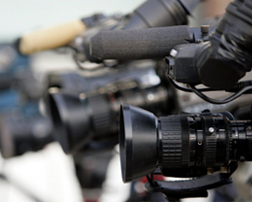It’s easy to think of the news media as a nuisance when reporters come barging in and asking questions. And why not? After all, talking to the media takes time and a great deal of patience.
Treating reporters and media outlets like a pain can cause problems down the road. Good media exposure can mean serious free publicity and brand recognition, which is why it is a good idea to develop good ties with the media.
Believe it or not, reporters are human beings, and as such, they prefer to work with people with whom they have developed good relationships. In a way, it’s a give-and-take relationship. If you are patient with a reporter when he or she comes to you with questions about a developing story, you will have a much better chance of being taken seriously when you pitch ideas later on.
This isn’t a terribly novel idea, but it’s one that often gets overlooked in a lot of businesses.
Reporters spend a lot of time trying to find sources in the community they can go to consistently with questions and expert advice. I have met many reporters over the years, and I can tell you that they aren’t all out to bring you down. They are people just like you and I. If you can gain a reporter’s respect, he or she will take you seriously when you call up and try to pitch something, or if you have to make the dreadful call when a newspaper makes a mistake.
Another point to make is that the media is not in the business of being your free PR outlet. Business owners often become frustrated when they send press releases and pitches to editors and don’t end up seeing a story result in the next day’s paper. Well, that’s just the way it works.
News is a business, which means newspapers and media outlets will only publish what they deem newsworthy. If they decide your pitch isn’t fit for print, that is their prerogative, and you must respect it. However, there are some ways to increase your chances of getting that highly valuable media exposure.
One is honing your press release writing skills. Press releases are very similar to news articles in a lot of ways. In fact, many college public relations programs require that their students take newswriting classes to get a feel for how to write for a newspaper. Why? If your press release sounds like news, it’s far more likely to catch the eyes and ears of people working in the news industry.
It’s also important that you not bombard editors with press releases. Sending them too often waters down their significance, and soon editors will quit reading them all together and file them in the recycling bin instead of the assignment bin.
I’ve worked with the media for decades, and I can say from experience that developing good working relationships with the press, even when it seems like a headache, can be a huge benefit to you and your brand. It takes work, but you will have an advantage down the road if you are patient and let reporters do their jobs. If you give them the respect they reserve, they will return it; and you can develop great working relationships with the news media.





